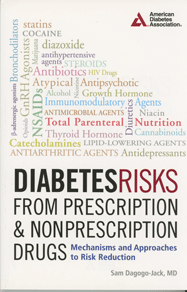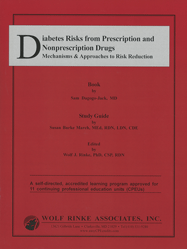|
Diabetes Risks from Prescription and Nonprescription Drugs
Mechanisms and Approaches to Risk Reduction
| C301 |
11 CPEUs |
HARD COPY |
$104.95
|
|
Discusses the impact of major drug classes on glycemic control in people with diabetes, and on the risk of drug-induced diabetes in the general population, debunking myths, and clarifying misperceptions. Conveniently organized by type and class of drugs it will enable you to:
- Evaluate antipsychotic and antidepressant medications for their potential to increase risk for diabetes.
- Recommend to patients/clients evidence-based lifestyle modifications to manage glycemia.
- Explain how Total Parenteral Nutrition (TPN) can impact risk for diabetes.
- Explain the diabetes-related dangers of recreational drugs and impact on blood glucose.
- Plus much, much more.
Share with a friend and Save! Click here for important information about
sharing.
To order an ADDITIONAL Reporting Form click below:
| C301F |
11 CPEUs |
REPORTING FORM |
$40.00 |

|
Diabetes Risks from Prescription and Nonprescription Drugs
Mechanisms and Approaches to Risk Reduction
© 2024 Wolf Rinke Associates. All rights reserved for this self-directed accredited learning activity. Reproduction in whole or part without written permission, except for brief excerpts, is prohibited.
LEARNING OBJECTIVES
Upon completion of this CPE activity you will be better able to:
-
Explain the classification, diagnostic criteria, and inherent and lifestyle risk factors for prediabetes, Type 1 and Type 2 diabetes.
-
Evaluate antihypertensive medications for their potential to increase the risk for diabetes, and discuss possible alternatives.
-
Explain steroid therapy and possible affects on blood glucose.
-
Assess how lifestyle intervention programs can impact risk for progression from prediabetes to diabetes.
-
Evaluate lipid-lowering agents for their risk for diabetes, and identify favorable alternatives.
-
Discuss organ transplantation and immunosuppressive medications, and associated risk factors for diabetes.
-
Explain how antimicrobial agents may impact health, weight, and blood glucose.
-
Evaluate approaches to management and risk reduction for patients with HIV-AIDS.
-
Assess how antiretroviral drugs are associated with increased risk for adverse metabolic effects.
-
Evaluate antipsychotic and antidepressant medications for their potential to increase risk for diabetes and assess appropriate medications for glycemic control.
-
Implement current research associated with gender, ethnicity, and diabetes risk.
-
Recommend to patients/clients evidence-based lifestyle modifications to manage glycemia.
-
Explain how Total Parenteral Nutrition (TPN) can impact risk for diabetes.
-
Assess how analgesic over-the-counter supplements and medications can impact blood glucose.
-
Explain the diabetes-related dangers of recreational drugs and impact on blood glucose.
-
Discuss the relationship between male testosterone status, supplemental therapy, and potential risk of diabetes.
ABOUT THE AUTHOR OF THE STUDY GUIDE
Over the past 25 years Susan Burke March, MEd, RDN, LDN, CDE has made her personal passion for healthy living and smart weight management her vocation.
Susan holds undergraduate and graduate degrees in nutrition and education, is a certified diabetes educator, and holds advanced certificates of training in Adult Weight Management (Levels 1 and 2) and Childhood and Adolescent Weight Management. She served as Chief Clinical Nutrition Manager at Mt. Sinai Hospital of Queens, New York.
Susan is the former Vice President of Nutrition and Chief Nutritionist for eDiets.com, a leader in the online weight management program arena. She led the nutritional development of a roster of healthy weight programs, and spearheaded development of unprecedented features and services that today are commonplace in the online weight management industry.
Susan served on the board of the Weight Management Dietetic Practice Group of the Academy of Nutrition and Dietetics, and as a spokesperson for the Florida Academy of Nutrition and Dietetics.
Susan is the author of the practical and informative book Making Weight Control Second Nature: Living Thin Naturally (Mansion Grove House, 2009) and the accompanying 26 CPEU study guide published by Wolf Rinke Associates (2010).
She and her husband Ken are currently living and studying Spanish in Ecuador’s third largest city, Cuenca. Susan is the Nutrition and Health Columnist for CuencaHighlife.com, and blogs on SecondNatureNutrition.com about Ecuadorian food, health issues, and nutrition news for the expat community.
If you prefer to order by phone, mail
or fax click below
or click here to contact us with
other questions.
For information about our other products and
services return to the sidebar at the top of the page.
|
|
|



